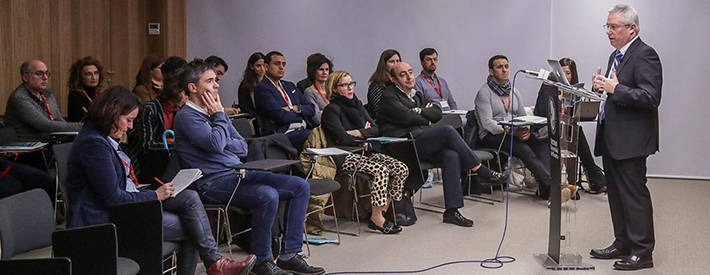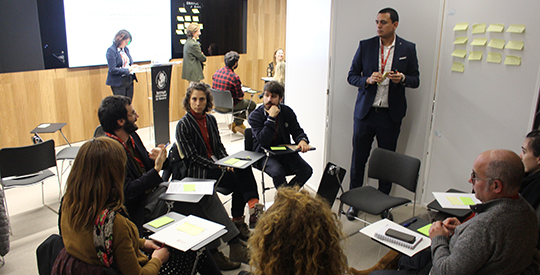News
LATEST NEWS AND EVENTS FROM THE SCHOOL OF ENGINEERING
Tecnun hosts the workshop "Economics circular: achievements and opportunities" in collaboration with the Provincial Council of Gipuzkoa.
The deputy José Ignacio Asensio pointed out that "it is essential to join forces with companies and universities to promote a sector that employs 5,000 people in our territory".

The department of Environment of the Provincial Council of Gipuzkoa and the School of Engineers of the University of Navarra havepresented a diagnostic tool that allows to analyze the current status of companies of different sizes and sectors, and evaluate their growth potential in the field of circular Economics . In the workshop "Economics circular: achievements and opportunities", held in Tecnunthe conclusions of the study "EZI. Economics Circular in Gipuzkoa", whose goal is to analyze the particularities of the companies in the territory in order to understand the current state of the business fabric of Gipuzkoa and to advance its future opportunities in this field. The diagnostic tool is based on the indicators of the Economics circular created by the European Commission, but adapted to the business context.
A total of 17 companies have participated in this diagnosis, 11 of which belong to the reuse and recycling cluster of Gipuzkoa 'GK Recycling'. The 17 companies represent different industrial sectors which, on average, have an annual turnover of more than 50 million euros. 17% of the companies consulted identify their industrial activity in the Mechanical Engineering and electrical sector; while 36% are identified in construction, basic metal production or recycling, manufacturing and reuse. This indicates that more than half of the companies diagnosed have the potential to generate some subject of waste to feed another company.

The deputy José Ignacio Asensio explained that we must move towards a model of Economics circular consisting of three fundamental aspects: an environmental axis, of sustainability and respect for the planet that is a model of lower greenhouse gas emissions and with sustainable production and manufacturing of proximity; a social axis so that those countries, territories and cities that are strategically positioned in the promotion of the Economics circular get to be an engine of employment; and finally, an economic axis based on the Economics circular that emerges as an opportunity for growth for our companies and industries. In this regard, the regional responsible has stated that "the circular Economics plays a key role in the fight against climate change. We must join forces and transform waste and climate change into an opportunity to create wealth and employment in a more sustainable Gipuzkoa". In this sense, Asensio has highlighted that "at present, the recycling sector and the circular Economics has a Issue of 500 million euros and employs 5,000 people. In the next ten years, Gipuzkoa can double these figures and exceed 10,000 jobs in the sector".
The circular Economics is a new model that seeks the economic development in an environmentally sustainable way. This model proposes a Economics based on the use and recovery of biological and technical cycles of resources in the different phases of extraction, transformation, distribution and consumption. In this way, a more efficient use of material flows is achieved, waste is minimized and symbiosis is encouraged.
The Environment department of the Provincial Council of Gipuzkoa is moving in the direction of improving the environment and promote the circular Economics through various actions such as the creation of the recycling cluster GK Recycling or the sustainable fashion cluster GK Green Fashion.
Tecnun-University of Navarra has been working for some time on the idea of informing and promoting the transition of companies from a linear to a circular economic model and, in this sense, is working on the integration of small and medium enterprises in the circular Economics .
